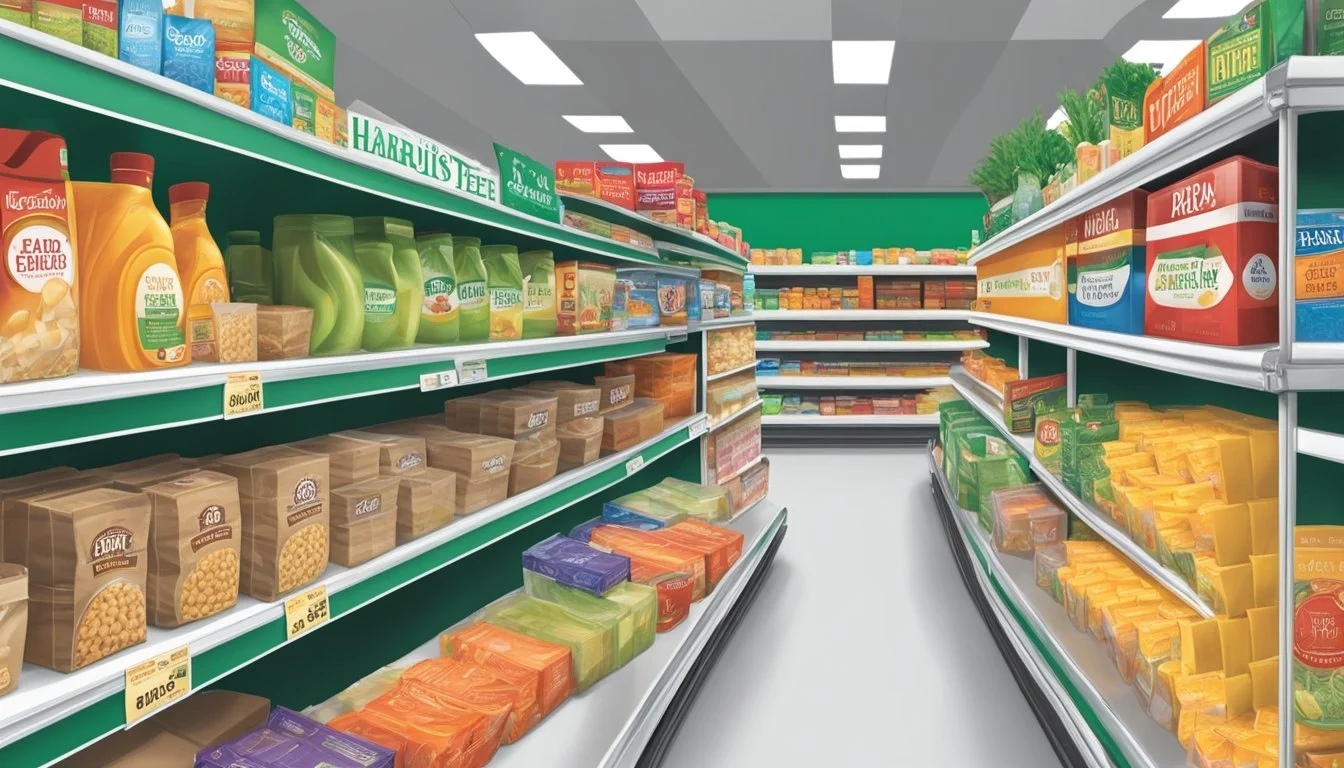Is Harris Teeter Cheaper Than Winn-Dixie?
A price comparison of two major supermarkets
Harris Teeter and Winn-Dixie are two popular grocery chains in the southeastern United States. Many shoppers wonder which store offers better prices for their everyday grocery needs.
Winn-Dixie tends to be cheaper than Harris Teeter for many common household items. A price comparison of specific products reveals that Winn-Dixie's store brand, SE Grocers, often costs about 20% less than comparable national brand products at Harris Teeter. This price difference is particularly noticeable for staples like white sandwich bread and raw chicken.
While Harris Teeter may have higher prices on some items, it's known for offering a wider variety of products and a more upscale shopping experience. Shoppers must weigh the trade-offs between price, selection, and store atmosphere when choosing between these two grocery chains.
Overview of Harris Teeter and Winn-Dixie
Harris Teeter and Winn-Dixie are two prominent supermarket chains operating in the eastern United States. Both have rich histories and significant market presence in their respective regions.
Company Histories and Expansion
Harris Teeter began as two separate stores in North Carolina in the 1930s. Harris Super Markets and Teeter's Food Mart merged in 1960 to form Harris Teeter. The company grew steadily, expanding its reach across the Southeast.
Winn-Dixie's roots trace back to 1925 when William Davis founded Winn & Lovett in Miami. Through acquisitions and mergers, it became Winn-Dixie Stores, Inc. in 1955. The chain expanded rapidly throughout the southern states.
Both companies faced challenges and underwent ownership changes. The Kroger Company acquired Harris Teeter in 2014. Winn-Dixie filed for bankruptcy in 2005 but emerged stronger in 2006.
Current Market Presence and Locations
Harris Teeter operates over 250 stores across seven states. Its primary markets include North Carolina, South Carolina, Virginia, and Georgia. The chain is known for its upscale image and focus on customer service.
Winn-Dixie maintains a strong presence in the Deep South. It has approximately 500 stores across five states: Alabama, Florida, Georgia, Louisiana, and Mississippi. The company positions itself as a neighborhood grocer with competitive prices.
Both chains continue to adapt to changing consumer preferences. Harris Teeter emphasizes fresh produce and prepared foods. Winn-Dixie focuses on value and local products to compete with larger national chains.
Comparing Shopping Experience
Harris Teeter and Winn-Dixie offer distinct shopping environments that cater to different customer preferences. Their approaches to store layout, customer service, and convenience features shape unique experiences for shoppers.
Store Layout and Atmosphere
Harris Teeter stores typically feature a more upscale ambiance with spacious aisles and modern fixtures. The layout often includes specialty departments like artisanal bakeries and gourmet cheese sections.
Winn-Dixie opts for a more traditional supermarket design. Their stores focus on practicality and ease of navigation. The atmosphere is generally more casual and budget-friendly.
Both chains organize products logically, but Harris Teeter may group items by cuisine or meal type. Winn-Dixie usually follows a conventional grocery store layout with clearly marked aisles.
Customer Service
Harris Teeter prides itself on attentive customer service. Staff members are often readily available to assist shoppers and answer questions. The chain invests in employee training to ensure knowledgeable and courteous interactions.
Winn-Dixie maintains a friendly approach to customer service. Their staff typically focuses on efficiency and basic helpfulness. The service style aligns with their value-oriented shopping experience.
Both stores offer carry-out assistance, but Harris Teeter may provide additional services like special order fulfillment.
Convenience Features
Harris Teeter emphasizes convenience through technology. They offer mobile apps for digital coupons, online ordering, and ExpressLane pickup services. Many locations feature in-store pharmacies and fuel centers.
Winn-Dixie provides practical convenience features. These include self-checkout lanes and basic online shopping options. Some stores offer pharmacy services and fuel rewards programs.
Both chains have loyalty programs, but Harris Teeter's tends to offer more personalized rewards. Winn-Dixie focuses on straightforward discounts and fuel perks.
Harris Teeter often extends store hours for added shopping flexibility. Winn-Dixie typically maintains standard supermarket hours, prioritizing consistent availability during peak shopping times.
Product Selection and Quality
Harris Teeter and Winn-Dixie offer diverse product ranges with varying quality levels. Both stores strive to meet customer needs through fresh offerings, store brands, and specialty items.
Fresh Produce and Meats
Harris Teeter is known for its high-quality fresh produce and meats. The store often features a wider variety of fruits and vegetables, including organic options. Their meat department typically offers prime cuts and specialty items.
Winn-Dixie provides competitive fresh offerings as well. The store focuses on locally sourced produce when possible. Their meat department offers standard cuts at affordable prices.
Both chains maintain strict quality control measures for their fresh departments. Harris Teeter may have a slight edge in variety and premium options, while Winn-Dixie emphasizes value.
Store Brand vs. National Brands
Harris Teeter's store brand, "Harris Teeter," is well-regarded for its quality. It often competes directly with national brands in taste and ingredients. The chain offers a wide range of store-brand products across various categories.
Winn-Dixie's "SE Grocers" brand provides budget-friendly alternatives to national brands. Many SE Grocers items match the quality of their name-brand counterparts at lower prices. For example, SE Grocers white sandwich bread is typically 20% cheaper than similar national brand products.
Both stores stock popular national brands alongside their private labels. This gives customers a choice between familiar favorites and cost-effective alternatives.
Organic and Specialty Items
Harris Teeter offers an extensive selection of organic and specialty items. Their stores often feature dedicated sections for these products. Customers can find a wide range of organic produce, gluten-free options, and international foods.
Winn-Dixie has been expanding its organic and specialty offerings in recent years. While their selection may not be as extensive as Harris Teeter's, they provide popular organic brands and some specialty items.
Both chains cater to health-conscious consumers with their organic produce sections. Harris Teeter typically offers a broader range of specialty and gourmet items, appealing to customers seeking unique products.
Price Comparison Analysis
Harris Teeter and Winn-Dixie employ different pricing strategies to attract customers. Their approaches to everyday prices, sales, and loyalty programs significantly impact overall shopping costs.
Everyday Prices
Winn-Dixie generally offers lower prices on everyday items compared to Harris Teeter. For example, Winn-Dixie's store brand white sandwich bread is priced at $1.99, approximately 20% cheaper than similar products at Harris Teeter. This price difference extends to other staples like raw chicken.
Harris Teeter's pricing tends to be higher on regular items. However, they often stock a wider variety of premium and specialty products, which can justify the increased costs for some shoppers.
Discounts and Sales
Both chains run frequent sales and promotions, but their approaches differ. Winn-Dixie typically offers more widespread discounts on a larger number of items. Their weekly circular features numerous deals across various departments.
Harris Teeter focuses on deeper discounts for fewer items. They often run "Buy 2, Get 3 Free" promotions on select products, which can lead to significant savings for bulk purchases.
Digital coupons are available at both stores, allowing customers to stack savings on top of sale prices.
Loyalty Programs and Savings
Winn-Dixie's SE Grocers rewards program provides points on purchases that can be redeemed for grocery discounts. Members also receive personalized deals based on shopping history.
Harris Teeter's VIC (Very Important Customer) program offers exclusive pricing on select items throughout the store. VIC cardholders can access digital coupons and earn fuel points for discounts at participating gas stations.
Both loyalty programs are free to join and can lead to substantial savings over time. However, Winn-Dixie's program tends to offer more immediate discounts on everyday purchases.
Market Segment and Target Customers
Harris Teeter and Winn-Dixie target different segments of the grocery market. Their strategies cater to distinct customer preferences, affecting pricing and product offerings.
Budget-Conscious Shoppers
Winn-Dixie appeals to cost-sensitive consumers. The chain focuses on competitive pricing and value-oriented products. Families and individuals looking to stretch their grocery budgets often choose Winn-Dixie for everyday essentials.
Winn-Dixie's SE Grocers private label offers alternatives to national brands at lower prices. These products typically cost 20% less than comparable name-brand items. Budget shoppers appreciate the savings on staples like bread and chicken.
The store's layout and promotions emphasize affordability. Weekly deals and loyalty programs further attract price-conscious customers. Winn-Dixie's market strategy centers on providing reliable quality at accessible price points.
Upscale Market and Product Selection
Harris Teeter positions itself in the premium grocery segment. The chain caters to shoppers seeking higher-end products and a more curated shopping experience. Its stores often feature expanded organic and gourmet selections.
Product variety is a key differentiator for Harris Teeter. The retailer offers a wider range of specialty and international items. This appeals to customers with diverse tastes and dietary preferences.
Harris Teeter's pricing reflects its upscale positioning. While not the lowest-cost option, the chain provides value through quality and selection. Thursdays feature a 5% discount for seniors, balancing premium offerings with targeted savings.
The store design and customer service align with its upmarket image. Clean, well-organized aisles and attentive staff contribute to a more refined shopping atmosphere.
Impact of Competing Chains on Pricing
The presence of various grocery chains significantly influences pricing strategies at Harris Teeter and Winn-Dixie. Competition from national and regional players shapes how these stores set their prices and offer promotions to attract customers.
Comparison with National Grocery Chains
Harris Teeter and Winn-Dixie face stiff competition from major national chains like Walmart, Kroger, and Aldi. Walmart's everyday low prices often set a baseline that other stores must consider. Kroger, with its extensive network, can leverage economies of scale to offer competitive pricing.
Aldi's no-frills approach and focus on private labels allow for substantially lower prices. This forces Harris Teeter and Winn-Dixie to adjust their strategies, often emphasizing quality and customer service to justify higher prices on certain items.
Whole Foods and Trader Joe's, known for specialty and organic products, influence pricing in these categories. Harris Teeter may price its organic offerings competitively against these chains to attract health-conscious consumers.
Effects of Regional Competitors
Regional chains like Publix and Food Lion play a crucial role in local markets where Harris Teeter and Winn-Dixie operate. Publix's strong presence in the Southeast impacts pricing decisions, especially on fresh produce and prepared foods.
Food Lion's focus on value pricing creates pressure on both Harris Teeter and Winn-Dixie to offer competitive deals on everyday items. This competition often results in frequent promotions and loyalty program discounts.
Wegmans, with its cult-like following in certain regions, influences expectations for store experiences and product quality. This may lead Harris Teeter to invest in store aesthetics and premium product lines to justify higher prices in some categories.
Strategies for Saving on Groceries
Smart shopping tactics can significantly reduce grocery bills. These approaches focus on maximizing value while minimizing costs.
Effective Use of Coupons and Deals
Coupons and promotional offers provide substantial savings opportunities. Digital coupons accessed through store apps or websites offer convenience and instant discounts. Loyalty programs reward frequent shoppers with points or personalized deals.
Many stores offer weekly circular ads featuring sale items. Comparing these ads across different stores helps identify the best prices. Some retailers even match competitors' prices, amplifying savings potential.
Stacking coupons with sale prices maximizes discounts. Timing purchases to coincide with promotional cycles can yield additional savings. Seasonal sales often present opportunities for bulk buying at reduced prices.
Creating a Cost-Efficient Meal Plan
Meal planning is a cornerstone of budget-conscious grocery shopping. Start by taking inventory of pantry staples and perishables on hand. This prevents unnecessary purchases and reduces food waste.
Build meals around sale items and seasonal produce for better value. Incorporating versatile ingredients that can be used in multiple dishes stretches the budget further.
Plan for leftovers to minimize cooking frequency and maximize ingredient usage. Batch cooking and freezing portions can save both time and money in the long run.
Shopping Tips for Cost Savings
Comparing unit prices helps identify the best value, especially for bulk items. Generic or store-brand products often offer similar quality at lower prices than name brands.
Shopping the perimeter of the store first focuses on fresh, whole foods which are typically more cost-effective than processed alternatives. Avoiding pre-cut produce and opting for whole fruits and vegetables reduces costs.
Limiting shopping trips reduces impulse buys. Sticking to a prepared grocery list prevents overspending. Cash or envelope budgeting systems can help enforce spending limits.
Buying in bulk for non-perishable items or frequently used products can lead to significant savings over time. However, it's crucial to ensure storage space and ability to use items before expiration.
Long-Term Customer Relationships
Both Harris Teeter and Winn-Dixie employ strategies to foster enduring connections with their shoppers. These efforts focus on rewarding loyal customers and ensuring high levels of satisfaction with each visit.
The Role of Customer Loyalty Programs
Harris Teeter offers the VIC (Very Important Customer) program, providing personalized deals and fuel points. Members receive digital coupons, special pricing, and exclusive promotions tailored to their shopping habits.
Winn-Dixie counters with their SE Grocers rewards program. This initiative allows customers to earn points on purchases, which can be redeemed for grocery discounts or fuel savings at participating gas stations.
Both programs aim to incentivize repeat visits and increase customer spend. They also collect valuable data on shopping preferences, enabling the stores to refine their offerings and marketing strategies.
Maintaining High Customer Satisfaction
Harris Teeter emphasizes a premium shopping experience with well-trained staff and upscale store environments. They focus on product quality and variety, particularly in fresh departments like produce and deli.
Winn-Dixie prioritizes competitive pricing and community engagement. They strive to create a family-friendly atmosphere and often participate in local events and charitable initiatives.
Both chains invest in clean, well-organized stores and responsive customer service. They also offer conveniences like online ordering, curbside pickup, and home delivery to meet evolving shopper needs.
Regular customer feedback surveys help both retailers identify areas for improvement and maintain high satisfaction levels.
Conclusion
Harris Teeter generally offers higher prices compared to Winn-Dixie. This price difference is particularly noticeable for everyday items.
Winn-Dixie's store brand, SE Grocers, provides significant savings. It often costs 20% less than comparable national brands for staples like white sandwich bread and raw chicken.
Price-conscious shoppers may find Winn-Dixie more appealing due to its lower overall prices. However, individual preferences for store atmosphere, product selection, and location should also be considered.
Both supermarkets have their strengths. Harris Teeter is known for its upscale shopping experience, while Winn-Dixie focuses on value.
Ultimately, the choice between these grocery stores depends on personal priorities. Budget-minded consumers may lean towards Winn-Dixie, while those seeking a premium experience might prefer Harris Teeter.
Regular comparison of prices, especially for frequently purchased items, can help shoppers maximize their savings at either store.









